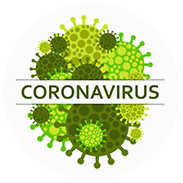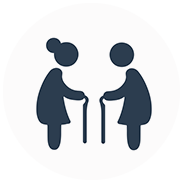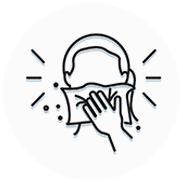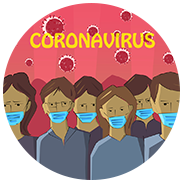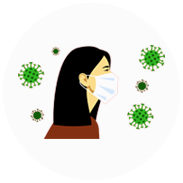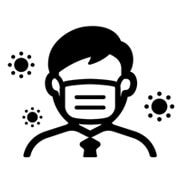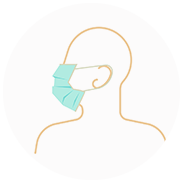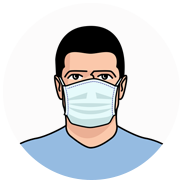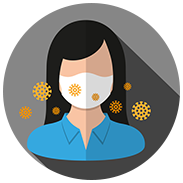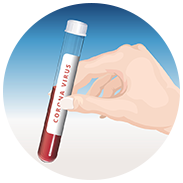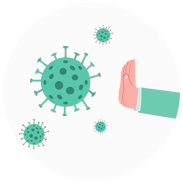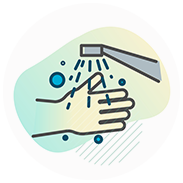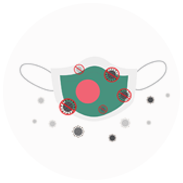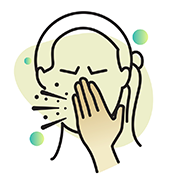The COVID-19 virus can spread in hot and humid climates
The best way to protect yourself against COVID-19 is by maintaining physical distance of at least 1 metre from others and frequently cleaning your hands. By doing this you eliminate viruses that may be on your hands and avoid infection that could occur by then touching your eyes, mouth, and nose.
People should NOT wear masks while exercising
People should NOT wear masks when exercising, as masks may reduce the ability to breathe comfortably.
Sweat can make the mask become wet more quickly which makes it difficult to breathe and promotes the growth of microorganisms. The important preventive measure during exercise is to maintain physical distance of at least one meter from others.
Vitamin and mineral supplements cannot cure COVID-19
Micronutrients, such as vitamins D and C and zinc, are critical for a well-functioning immune system and play a vital role in promoting health and nutritional well-being. There is currently no guidance on the use of micronutrient supplements as a treatment of COVID-19.
WHO is coordinating efforts to develop and evaluate medicines to treat COVID-19.
Hand sanitizers can be used often
An alcohol-based sanitizer does not create antibiotic resistance. Unlike other antiseptics and antibiotics, pathogens (harmful germs) do not seem to develop resistance to alcohol-based sanitizers.
Alcohol-based sanitizers are safe for everyone to use
Alcohols in the sanitizers have not been shown to create any relevant health issues. Little alcohol is absorbed into the skin, and most products contain an emollient to reduce skin dryness. Allergic contact dermatitis and bleaching of hand hair due to alcohol are very rare adverse effects. Accidental swallowing and intoxication have been described in rare cases.
Alcohol-based sanitizers can be used in religions where alcohol is prohibited
Any manufactured substance developed to alleviate illness or contribute to better health is permitted by the Qur'an, including alcohol used as a medical agent.
It is safer to frequently clean your hands and not wear gloves
Wearing gloves risks transferring germs from one surface to another and contaminating your hands when removing them. Wearing gloves does not replace cleaning hands. Health workers wear gloves only for specific tasks.
Touching a communal bottle of alcohol-based sanitizer will not infect you
Once you've sanitized your hands, you have disinfected them from any germs that may have been on the bottle. If everyone uses sanitizer in a public place such as a supermarket entrance, the risk of germs on communal items will be lower and will help keep everyone safe.
Is dexamethasone a treatment for all COVID-19 patients?
Dexamethasone should be reserved for patients who need it most. It should not be stockpiled.
It provided no improvement for patients with mild symptoms. Dexamethasone is a corticosteroid used for its anti-inflammatory and immunosuppressive effects. For some COVID-19 patients on ventilators, a daily 6 mg dose of dexamethasone for 10 days improved their health.
Can shoes spread the COVID-19 virus?
The likelihood of COVID-19 being spread on shoes and infecting individuals is very low. As a precautionary measure, particularly in homes where infants and small children crawl or play on floors, consider leaving your shoes at the entrance of your home. This will help prevent contact with dirt or any waste that could be carried on the soles of shoes.
5G mobile networks do not spread COVID-19
Viruses cannot travel on radio waves/mobile networks. COVID-19 is spreading in many countries that do not have 5G mobile networks.
COVID-19 spread through respiratory droplets when an infected person coughs, sneezes or speaks. People can also be infected by touching a contaminated surface and then their eyes, mouth or nose.
Exposing yourself to the sun or to temperatures higher than 25°C degrees does not prevent the coronavirus disease (COVID-19)
You can catch COVID-19, no matter how sunny or hot the weather is. Countries with hot weather have reported cases of COVID-19. To protect yourself, make sure you clean your hands frequently and thoroughly and avoid touching your eyes, mouth, and nose.
You can recover from the coronavirus disease (COVID-19). Catching the new coronavirus does not mean you will have it for life
Most of the people who catch COVID-19 can recover and eliminate the virus from their bodies. If you catch the disease, make sure you treat your symptoms. If you have cough, fever, and difficulty breathing, seek medical care early – but call your health facility by telephone first. Most patients recover thanks to supportive care.
Being able to hold your breath for 10 seconds or more without coughing or feeling discomfort does not mean you are free from the coronavirus disease (COVID-19) or any other lung disease
The most common symptoms of COVID-19 are dry cough, tiredness and fever. Some people may develop more severe forms of the disease, such as pneumonia. The best way to confirm if you have the virus producing COVID-19 disease is with a laboratory test. You cannot confirm it with this breathing exercise, which can even be dangerous.
Drinking alcohol does not protect you against COVID-19 and can be dangerous
Frequent or excessive alcohol consumption can increase your risk of health problems.
Cold weather and snow cannot kill the new coronavirus
There is no reason to believe that cold weather can kill the new coronavirus or other diseases. The normal human body temperature remains around 36.5°C to 37°C, regardless of the external temperature or weather. The most effective way to protect yourself against the new coronavirus is by frequently cleaning your hands with alcohol-based hand rub or washing them with soap and water.
Taking a hot bath does not prevent the new coronavirus disease
Taking a hot bath will not prevent you from catching COVID-19. Your normal body temperature remains around 36.5°C to 37°C, regardless of the temperature of your bath or shower. Actually, taking a hot bath with extremely hot water can be harmful, as it can burn you. The best way to protect yourself against COVID-19 is by frequently cleaning your hands. By doing this you eliminate viruses that may be on your hands and avoid infection that could occur by then touching your eyes, mouth, and nose.
The new coronavirus cannot be transmitted through mosquito bites
To date there has been no information nor evidence to suggest that the new coronavirus could be transmitted by mosquitoes. The new coronavirus is a respiratory virus which spreads primarily through droplets generated when an infected person coughs or sneezes, or through droplets of saliva or discharge from the nose. To protect yourself, clean your hands frequently with an alcohol-based hand rub or wash them with soap and water. Also, avoid close contact with anyone who is coughing and sneezing.
Are hand dryers effective in killing the new coronavirus?
No. Hand dryers are not effective in killing the 2019-nCoV. To protect yourself against the new coronavirus, you should frequently clean your hands with an alcohol-based hand rub or wash them with soap and water. Once your hands are cleaned, you should dry them thoroughly by using paper towels or a warm air dryer.
Can an ultraviolet disinfection lamp kill the new coronavirus?
UV lamps should not be used to sterilize hands or other areas of skin as UV radiation can cause skin irritation.
Thermal scanners CANNOT detect COVID-19
Thermal scanners are effective in detecting people who have a fever (i.e. have a higher than normal body temperature). They cannot detect people who are infected with COVID-19.
There are many causes of fever. Call your healthcare provider if you need assistance or seek immediate medical care if you have fever and live in an area with malaria or dengue.
Can spraying alcohol or chlorine all over your body kill the new coronavirus?
No. Spraying alcohol or chlorine all over your body will not kill viruses that have already entered your body. Spraying such substances can be harmful to clothes or mucous membranes (i.e. eyes, mouth). Be aware that both alcohol and chlorine can be useful to disinfect surfaces, but they need to be used under appropriate recommendations.
Do vaccines against pneumonia protect you against the new coronavirus?
No. Vaccines against pneumonia, such as pneumococcal vaccine and Haemophilus influenza type B (Hib) vaccine, do not provide protection against the new coronavirus.
The virus is so new and different that it needs its own vaccine. Researchers are trying to develop a vaccine against 2019-nCoV, and WHO is supporting their efforts.
Although these vaccines are not effective against 2019-nCoV, vaccination against respiratory illnesses is highly recommended to protect your health.
Can regularly rinsing your nose with saline help prevent infection with the new coronavirus?
No. There is no evidence that regularly rinsing the nose with saline has protected people from infection with the new coronavirus.
There is some limited evidence that regularly rinsing nose with saline can help people recover more quickly from the common cold. However, regularly rinsing the nose has not been shown to prevent respiratory infections.
Can eating garlic help prevent infection with the new coronavirus?
Garlic is a healthy food that may have some antimicrobial properties. However, there is no evidence from the current outbreak that eating garlic has protected people from the new coronavirus.
Does the new coronavirus affect older people, or are younger people also susceptible?
People of all ages can be infected by the new coronavirus (2019-nCoV). Older people, and people with pre-existing medical conditions (such as asthma, diabetes, heart disease) appear to be more vulnerable to becoming severely ill with the virus.
WHO advises people of all ages to take steps to protect themselves from the virus, for example by following good hand hygiene and good respiratory hygiene.
Are antibiotics effective in preventing and treating the new coronavirus?
No, antibiotics do not work against viruses, only bacteria.
The new coronavirus (2019-nCoV) is a virus and, therefore, antibiotics should not be used as a means of prevention or treatment.
However, if you are hospitalized for the 2019-nCoV, you may receive antibiotics because bacterial co-infection is possible.
Are there any specific medicines to prevent or treat the new coronavirus?
To date, there is no specific medicine recommended to prevent or treat the new coronavirus (2019-nCoV).
However, those infected with the virus should receive appropriate care to relieve and treat symptoms, and those with severe illness should receive optimized supportive care. Some specific treatments are under investigation, and will be tested through clinical trials. WHO is helping to accelerate research and development efforts with a range or partners.
Drinking methanol, ethanol or bleach DOES NOT prevent or cure COVID-19 and can be extremely dangerous
Methanol, ethanol, and bleach are poisons. Drinking them can lead to disability and death. Methanol, ethanol, and bleach are sometimes used in cleaning products to kill the virus on surfaces – however you should never drink them. They will not kill the virus in your body and they will harm your internal organs.
To protect yourself against COVID-19, disinfect objects and surfaces, especially the ones you touch regularly. You can use diluted bleach or alcohol for that. Make sure you clean your hands frequently and thoroughly and avoid touching your eyes, mouth and nose.
Spraying and introducing bleach or another disinfectant into your body WILL NOT protect you against COVID-19 and can be dangerous
Do not under any circumstance spray or introduce bleach or any other disinfectant into your body. These substances can be poisonous if ingested and cause irritation and damage to your skin and eyes.
Bleach and disinfectant should be used carefully to disinfect surfaces only. Remember to keep chlorine (bleach) and other disinfectants out of reach of children.
COVID-19 IS NOT transmitted through houseflies
To date, there is no evidence or information to suggest that the COVID-19 virus transmitted through houseflies. The virus that cause COVID-19 spreads primarily through droplets generated when an infected person coughs, sneezes or speaks. You can also become infected by touching a contaminated surface and then touching your eyes, nose or mouth before washing your hands. To protect yourself, keep at least 1-metre distance from others and disinfect frequently-touched surfaces. Clean your hands thoroughly and often and avoid touching your eyes, mouth and nose.
Adding pepper to your soup or other meals DOES NOT prevent or cure COVID-19
Hot peppers in your food, though very tasty, cannot prevent or cure COVID-19. The best way to protect yourself against the new coronavirus is to keep at least 1 metre away from others and to wash your hands frequently and thoroughly. It is also beneficial for your general health to maintain a balanced diet, stay well hydrated, exercise regularly and sleep well.
There are currently no drugs licensed for the treatment or prevention of COVID-19
While several drug trials are ongoing, there is currently no proof that hydroxychloroquine or any other drug can cure or prevent COVID-19. The misuse of hydroxychloroquine can cause serious side effects and illness and even lead to death. WHO is coordinating efforts to develop and evaluate medicines to treat COVID-19.
Most people who get COVID-19 recover from it
Most people who get COVID-19 have mild or moderate symptoms and can recover thanks to supportive care. If you have a cough, fever and difficulty breathing seek medical care early - call your health facility by telephone first. If you have fever and live in an area with malaria or dengue seek medical care immediately.
The prolonged use of medical masks* when properly worn, DOES NOT cause CO2 intoxication nor oxygen deficiency
The prolonged use of medical masks can be uncomfortable. However, it does not lead to CO2 intoxication nor oxygen deficiency. While wearing a medical mask, make sure it fits properly and that it is tight enough to allow you to breathe normally. Do not re-use a disposable mask and always change it as soon as it gets damp.
* Medical masks (also known as surgical masks) are flat or pleated; they are affixed to the head with straps or have ear loops.
Studies show hydroxychloroquine does not have clinical benefits in treating COVID-19
Hydroxychloroquine or chloroquine, a treatment for malaria, lupus erythematosus, and rheumatoid arthritis, has been under study as a possible treatment for COVID-19. Current data shows that this drug does not reduce deaths among hospitalised COVID-19 patients, nor help people with moderate disease.* The use of hydoxychloroquine and chloroquine is accepted as generally safe for patients with malaria and autoimmune diseases, but its use where not indicated and without medical supervision can cause serious side effects and should be avoided.* More decisive research is needed to assess its value in patients with mild disease or as pre- or post-exposure prophylaxis in patients exposed to COVID-19.
An alcohol-based handrub is listed as a WHO essential medicine
Clean hands protect patients, health workers, other caregivers and everyone from infection. Cleaning your hands is one of the key measures to prevent disease.
The amount of alcohol-based sanitizer you use matters
Apply a palmful of alcohol-based sanitizer to cover all surfaces of your hands. Rub your hands together using the right technique until they are dry.
The entire procedure should last 20-30 seconds.
Water or swimming does not transmit the COVID-19 virus
The COVID-19 virus does not transmit through water while swimming. However, the virus spreads between people when someone has close contact with an infected person.











